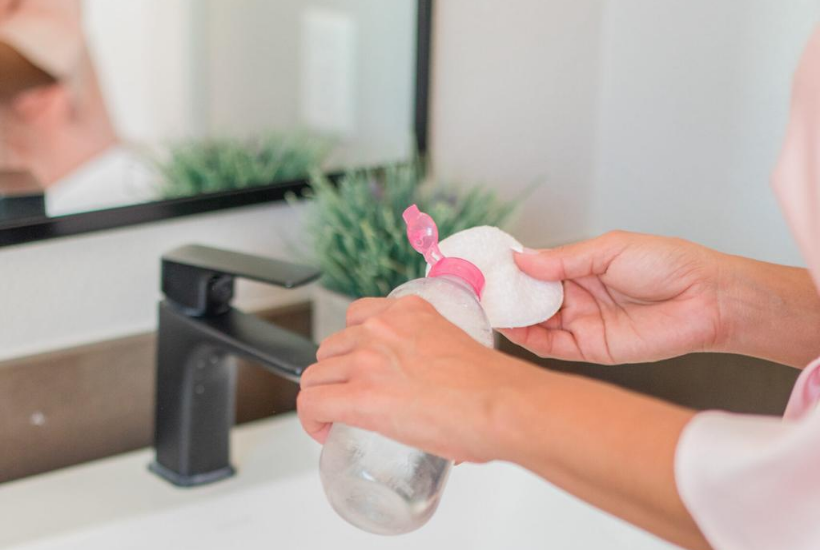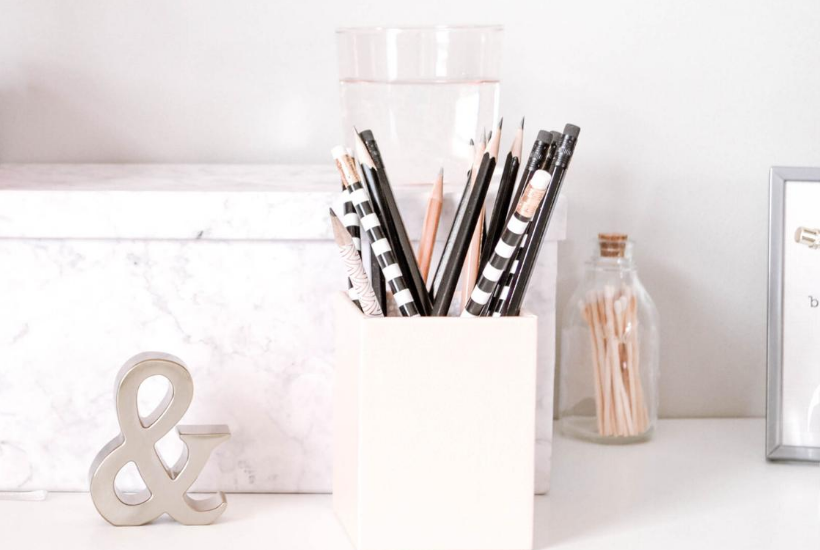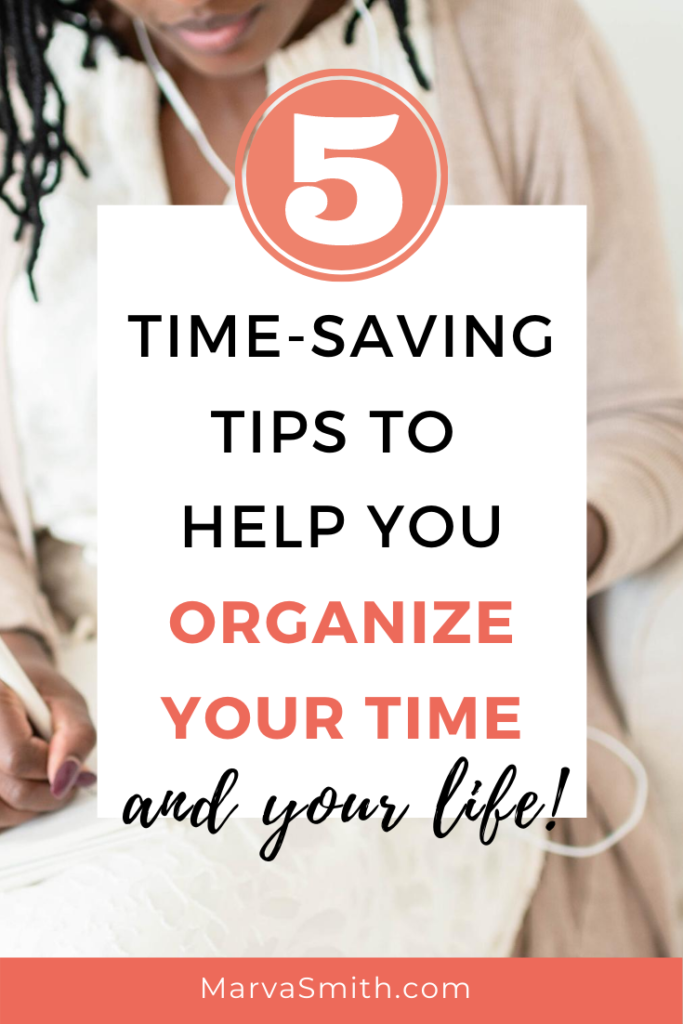If you want to slow down and enjoy life more, that won’t happen until you take time to organize your life. Doing so will save you a whole lot of stress, allowing you the physical and mental space you need.
As an added benefit, being organized in your everyday life saves you time and money. Here’s why.
Being efficient often translates to less stress.
Think of all the time you wasted looking all over the house for your phone or keys. When I find myself losing things too often, I know it’s time to get organized. The bottom line: if you keep your belongings organized, you won’t have to spend time looking for them when needed.
You don’t buy what you already have.
I just have to take one look at my spice and seasoning rack to tell you how true this is. I have two bottles of cinnamon, two Adobo seasoning, and two bottles of ground cloves, which I hardly ever use. It might not seem like much but buying things we already have can start to add up.

Important details are easier to remember.
Keeping track of every little detail can be hard when you have a lot going on. Bills go forgotten, credit card due dates get missed, and less frequent tasks like house maintenance are overlooked. But when you keep all your activities and responsibilities organized, you can stay on top of these small but important details.
Planning ahead saves you money.
Whether it’s planning your weekly meals or prepping for a birthday celebration, like I was this week, taking the time to plan will save you money in the long run. For example, frequently used items can be bought in bulk, which saves money and lets you make you one less trip to the store. Having supplies like gift bags and tissue paper is a good idea and so is keeping your eyes out for a deal on potential birthday or holiday gifts.
So, now that we’ve looked at some time- and money-saving reasons to be organized, how about those tips?
Want to get your life better organized? These super simple tips are just the place to start! Share on X5 Tips to Help you Organize Your Life

Getting organized isn’t as overwhelming as it sounds. These five simple tips rely more on consistency than fancy or complicated systems. To get the most out of these tips, choose one that you can stick with for the next 30 days. Make it a challenge to do that one thing well for the rest of the month, then add others as you go.
Tip #1: Start each day with a routine

Having a routine to start each day takes the guesswork out of what to do and how best to use your time. A simple routine can get you energized and ready to face your day.
I look at my morning routing as a way to center myself and get my mindset right before I start the day. Because my relationship with God is my number one priority, my routine always includes my devotional time with God.
Depending on how much time I have I may read a Bible study, a devotional book or a Bible app, then spend some time praying. You may also want to include exercise in your morning routine as well.
Then before jumping into the day, take a few minutes to consider what’s on the day’s agenda. From here you can make a list of activities that need to get done (your must-do’s) along with somethings that are nice to get done if you have time. Starting your day this way allows you focus on your priorities instead of getting sucked into someone else’s agenda.
Get organized: What does your morning routine look like? Is it setting you up for a productive day? What changes will you make?
Tip #2: Make time to plan

I know just that word ‘plan’ is a dirty word for some of you reading this but stick with me here. You don’t have to be a natural planner, and no one expects you to compete for the #plannergirl award. Having said that, there are some simple things you can do to help you plan and organize your life.
Start with the level of planning that is comfortable for you, such as a weekly basis or monthly basis. The simplest of planning starts with your calendar. So, whether you’re looking at the week ahead or the month, open your calendar and consider these 3 things:
- What activities are high on my priority list and are important to me?
- What have I already committed to that I need to leave room for?
- What else do I want to accomplish over this time period?
As a bonus, I suggest asking one more question, which is:
- How do I want to feel during this time?
This final question will help you determine how packed your schedule should be. If you know you don’t want to feel ragged during this time period, go ahead and build some downtime into your schedule. Of course, there’ll be times when things are super busy at work, launching a new product, or just a busy season overall.
Once you’ve asked those questions, take the next step that feels natural to you to help you keep track of your commitments and goals. This could be a running to-do list or a schedule of activities that are noted in your planner or Google calendar — whatever works for you.
We know things won’t always go as planned but having a plan to refer to will help you feel more at peace.
Get organized: Use the free planning pages inside the Thrive Insiders Resource Library to plan your day, week or month. Already a subscriber? Find your password in one of my recent emails.
Tip #3: Make time for you

In all your planning and doing, creating a space for you will go along way in giving you peace of mind as you organize your life. As women, I know it’s easy to meet everyone else’s needs only to leave yourself for last, but that, my friend is a quick road to burn-out. You don’t want to go there.
It’s important to carve out time for yourself in short spurts such as in your daily morning routine and for longer spells as well. Personal time in short bursts might look like reading a book, taking a long bath, taking a walk, or going for a run. Longer times might be a weekend getaway, a morning in a coffee shop, it all depends on what you like to do.
Carving out time for you doesn’t have to be complicated. You could start with a mini personal retreat right there at home. Use that time to consider what you will do next and how you can make alone time a priority.
Consider activities that bring you joy and light a spark in you. You’ll want to do more of those. A good way to find what those are is by doing a personal energy audit. This identifies the things that fill you up and the things that drain your energy. I think you know which one you’ll want to focus on.
If you’re not used to having alone time, you might not know where to start. The THRIVE 5-day challenge will help you identify exactly what to start with.
Get organized: What does it look like to make time for you? What are some of the things you like to do that you can make time for this month? Not sure what’s draining your energy or where you can fill up? Book a free discovery coaching session and let’s take a look together.
Tip #4: Think twice, do once

This principle applies to many areas of your life, whether at work or at home. Consider the instances where you’ve rushed into action without anticipating how it could work or the consequences involved. Quite often this led to mistakes that you had to go back and correct, which is counter-productive to saving you time.
Some people think that taking quick action is the best way to save time and be organized but I beg to differ. Many mistakes can be avoided by taking the time to think through your actions before you make a move. Thinking twice allows you the space to anticipate the obstacles and determine how to avoid, overcome or work around them.
Spontaneity has its place but slowing down long enough to think ahead and plan is worth it.
Get organized: How can you be more organized this week using this principle of thinking twice and doing once?
Tip #5: Everything in Its Place

Years ago, as a mom of young kids, I heard this quote which really stuck with me: a place for everything and everything in its place. I wish I could remember where it came from because they certainly deserve a lot of credit for this genius idea. Knowing exactly where to find something when you need it is priceless.
In order to put everything in its place, each item or group of items must have a designated place. If you don’t have that already, take a few moments to come up with a place to keep something and stick with it. If you’re going to put the mail in a designated spot on the counter, be sure to put all mail there, so that nothing gets missed.
Don’t be afraid of sorting your things too much. The more categories of things you come up with, the easier it will be to find exactly what you need when you need it.
I probably don’t have to tell you how important this tip is for rarely used items, such as insurance or tax information. It will drive you up a wall if you have to spend hours looking for important documents in a crunch – ask me how I know. So, save yourself the hassle by designating a place for everything and put things in their right places every single time. It’s easier to organize your life if everything has a designated space, starting with the little things.
And here’s a quick tip. If you’re assigning places around the house for items belonging to others, go ahead and communicate with them about it. You’ll want to ensure that it’s a space that they will naturally come back to over time, with some practice, of course.
Get organized: Do you have designated places for things you need to find on a regular basis? What about those important documents?
From having a morning routine to having a designated space for #allthethings, these 5 tips will help you organize your time AND your life. Share on XOrganization is beneficial for everyone and can be easily adapted to suit your individual needs. While it may take a bit of effort, organizing your life allows you to use your time more efficiently and take full advantage of your available resources. Being able to organize your life in a way that works for you and your family will help you stress less about the things you can’t control.
How about you?
I’d love to hear your thoughts on this article. Which tip did you choose to try out for the next month? Be sure to come back here and leave a comment on how it worked for you.
We’re all learning and growing together and your experiences can help someone else, so leave a comment and share your insights with us.
want to save these tips? Pin this post for later.

Need a next step? Take action with the THRIVE 5-Day Challenge.


[…] Save time by narrowing down your preferences in advance. For example, will you have a photo card this year, or choose a simple and elegant done-for-you design? Keeping it simple will help you avoid indecision fatigue and allow you to use your time more productively. […]